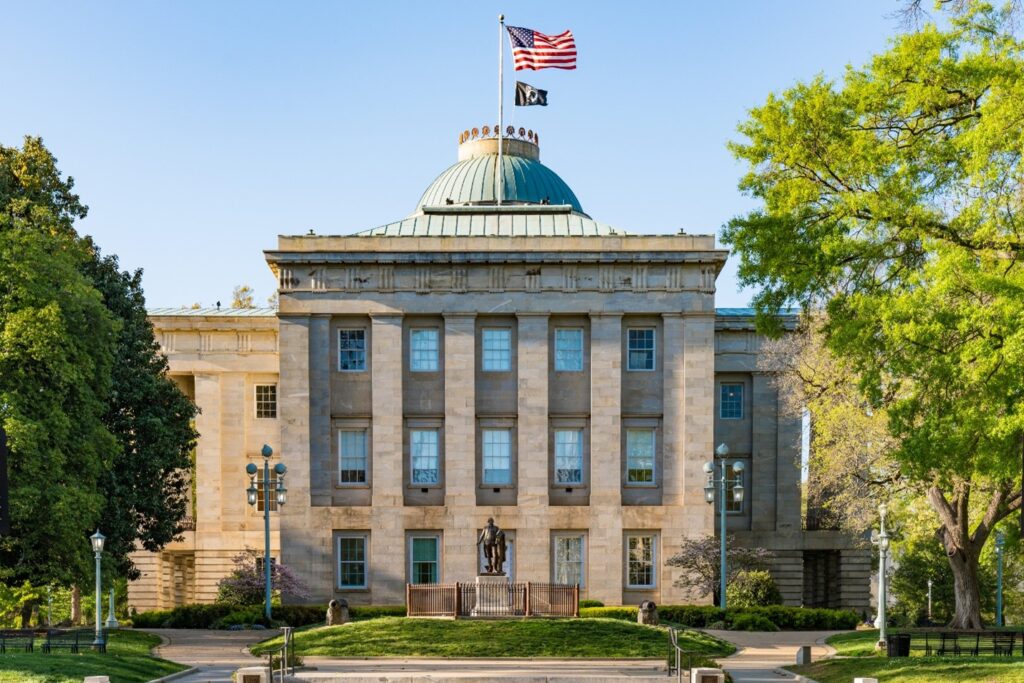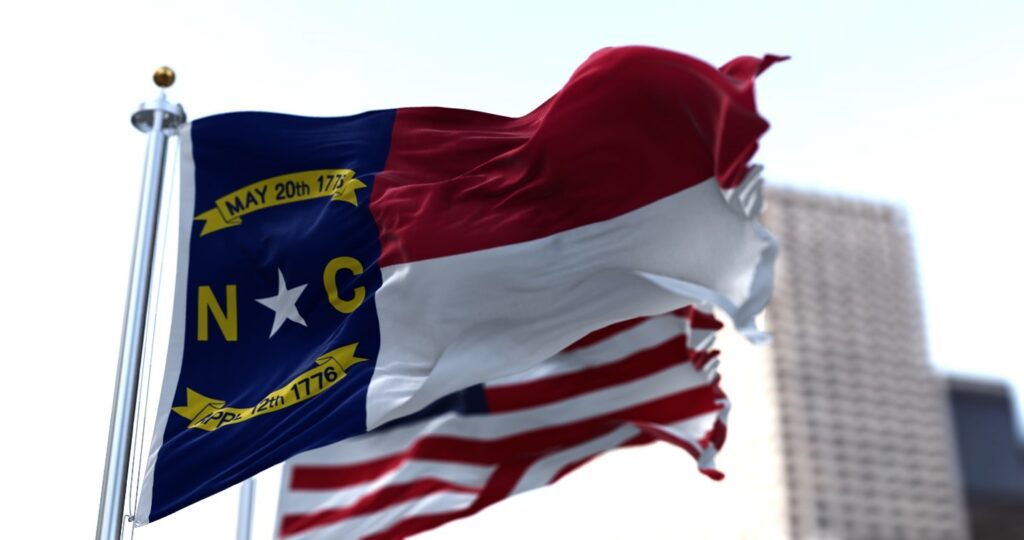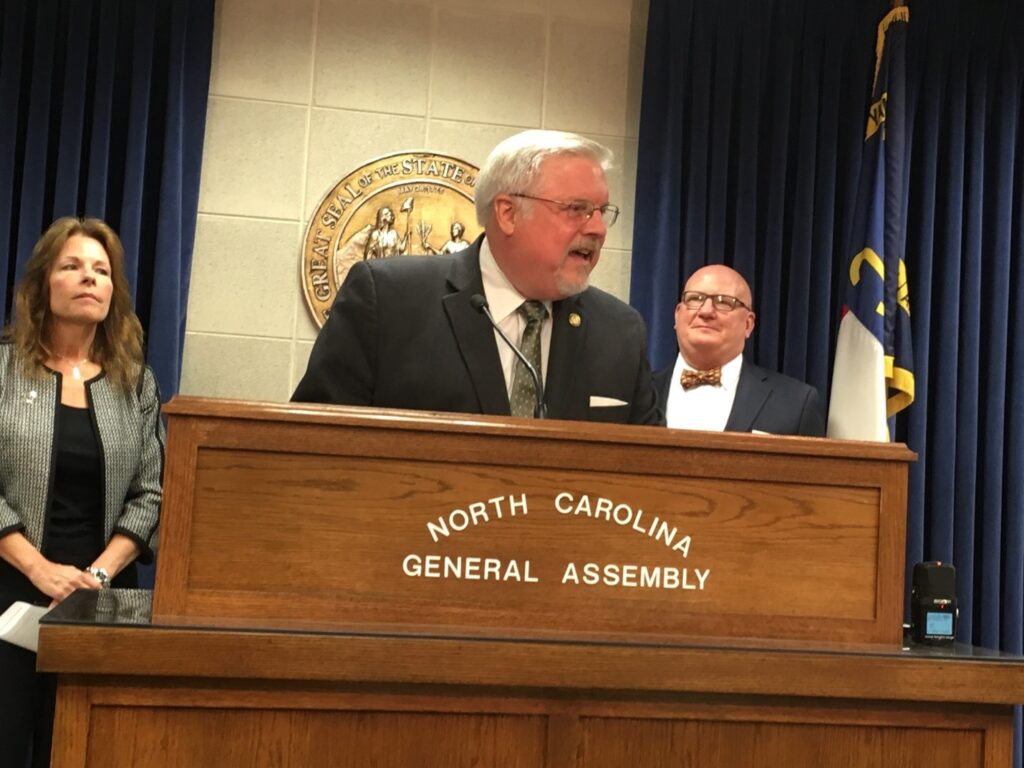
By CAL Staff
Christian Action League
December 11, 2021
North Carolina lawmakers adopted an adjournment resolution on November 30, calling for an end on December 10 to what is commonly called the “long session” of the 2021 – 2022 Legislative Biennium. Lawmakers, however, are expected to return on December 30 and address several bills, none of which were announced at the writing of this report.
This year, the “long session” has truly lived up to its name. Typically, it runs from January to the middle or end of July. This session has lasted for nearly twelve months, the longest in a decade. Lawmakers were bogged down in negotiations between the House and Senate on the state budget. Furthermore, the Republican-controlled legislature also found it challenging to craft a budget that a progressive Democrat Governor, Roy Cooper, would sign. Nevertheless, though arduous, negotiations were successful, and Governor Cooper signed SB 105 – 2021 Appropriations Act on November 18.
Add to this the General Assembly’s requirement to develop and pass new district maps for the state House, Senate, and U.S. Congress – a task already being challenged by multiple lawsuits – and it becomes increasingly clear why the session stretched out to such lengths.
Among other concerns, the 2021 Legislative Session for the Christian Action League was a mixed bag of successes, vetoes by Gov. Roy Cooper, and threatening legislation that could still be acted upon. This is the legislative wrap-up as it currently stands.

Legislative Successes
For the sake of this report, legislative successes are defined as legislation or public policy initiatives that the Christian Action League advocated for or supported, which became law, or legislation or public policy initiatives the Christian Action League opposed that failed to become law.
Changes to N.C. Marriage Law
S.B. 35 – Max 4-Yr Age Difference to Marry Under 18 Yrs., which is now law, raised the legal age to marry from 14 to 16. The law now says anyone 16 or 17 years of age is allowed to wed, but may only do so if they marry someone no more than four years older. Plus, the couple must have filed a certified copy of an order issued by a district judge allowing for the marriage. The impetus behind the initiative was child marriage had made North Carolina a hot spot for human trafficking. The evidence shows a greater risk for sexual and domestic violence, medical and mental health problems, and poverty when minors marry. This legislation will not prevent minors from marrying, but it considerably raises the bar and provides greater protections for them.
Adultery Still Has Consequences in NC
HB 485 – Amend 1 – T.R. Sep/Repeal Alien, of Aff/Crim. Con is legislation that would have repealed the current alienation of affection/criminal conversation law and eliminated any recourse a spouse has against someone who commits adultery with his/her spouse, which contributed to the failure of the marriage. The law failed to move through a committee hearing after Rev. Mark Creech, Ex. Dir. of CAL forcefully testified against the measure. Creech argued that the law effectively acts as a deterrent to home wrecking.
Patients Religious Rights Protected
HB 447 – The Jeff Reig Law/Patients requires a hospital to allow clergy members to visit admitted patients who wish to be seen by a clergy member, despite any disaster declarations or the use of the hospital as a temporary emergency center. The need for the measure was borne out of policies enforced by hospitals during the pandemic that prevented patients from receiving the services of the clergy. During the bill’s hearing, Rev. Creech told lawmakers, “This legislation affirms our citizens are not simply flesh and blood. They are also mind and spirit. And to deny citizens access to the necessary services of clergy, even in a moment of danger, is to impoverish them in the highest order.” The legislation was named in honor of Jeff Reig, the car accident victim who spent his last days in a Greenville hospital while his family fought for permission to have his pastor visit him.
F-Word Beer Label Nixed
Charlotte-based Sycamore Brewing tried unsuccessfully to get approval to feature the F-Word on the label of one of their beer products. The state’s ABC Commission nixed the initiative after the CAL opposed the proposal during an online meeting. Rev. Creech argued the initiative would contribute to “a more course society.” He quoted longtime columnist Bob Greene, who proclaimed that “words are vehicles; they convey messages. And to some people, the use of profanity is a message of ugliness and aggressiveness, and a disrespect for civil behavior.”

Vetoed Legislation
It is difficult to refer to the following bills as failures because they passed both legislative chambers. Nevertheless, technically they were failures because Governor Roy Copper vetoed the legislation. In each case, the Governor’s reasoning for his vetoes was egregious.
A Pro-life Bill
HB 453 – Human Life Non-Discrimination Act/No Eugenics – would have banned selective abortions based on race or a disability such as Down Syndrome. The current practice of sex-selective abortions based on race or because an unborn child has been diagnosed with Down Syndrome, which is often an incorrect diagnosis, is in principle no different from the Eugenics practiced at a dark time in North Carolina’s history. The Christian Action League’s position on the bill contended the destruction of an unborn child’s life because of race, disability, or because of the burden it creates is a gross act of discrimination that could ultimately lead to anyone at any stage of life already born being snuffed out for similar reasons. In his veto message, Gov. Cooper said he believed the proposed measure was unconstitutional. He also cited privacy concerns and argued the measure would have complicated the relationship between a woman and her doctor.
Banning CRT
HB 324 – Ensuring Dignity & Nondiscrimination/Schools pushed back against the indoctrination of Critical Race Theory. The legislation included 13 concepts, including many related to Critical Race Theory, which should not be foisted on students or teachers: (1) One race or sex is inherently superior to another race or sex; (2) An individual, solely by virtue of his or her race or sex, is inherently racist, sexist, or oppressive; (3) An individual should be discriminated against or receive adverse treatment solely or partly because of his or her race or sex; (4) An individual’s moral character is necessarily determined by his or her race or sex; (5) An individual, solely by virtue of his or her race or sex, bears responsibility for actions committed in the past by other members of the same race or sex; (6) Any individual, solely by virtue of his or her race or sex, should feel discomfort, guilt, anguish, or any other form of psychological distress; (7) A meritocracy is inherently racist or sexist; (8) The United States was created by members of a particular race or sex for the purpose of oppressing members of another race or sex; (9) The United States government should be violently overthrown; (10) Particular character traits, values, moral or ethical codes, privileges, or beliefs should be ascribed to a race or sex or to an individual because of the individual’s race or sex; (11) The rule of law does not exist, but instead is a series of power relationships and struggles among racial or other groups; (12) All Americans are not created equal and are not endowed by their Creator with certain unalienable rights, including life, liberty, and the pursuit of happiness; and (13) Governments should deny to any person within the government’s jurisdiction the equal protection of the law. After vetoing the legislation, Cooper erroneously argued, “The legislature should be focused on supporting teachers, helping students recover lost learning, and investing in our public schools. Instead, this bill pushes calculated, conspiracy-laden politics into public education.”
Protecting Worshippers
S.B. 43 – Protect Religious Meeting Places would have allowed conceal carry of guns during worship services at churches where a private school is housed. Churches in these circumstances are currently not allowed to have conceal carry and are prohibited from developing armed security teams. The bill would have only allowed conceal carry and security teams during non-school hours or curricular activities. Several pastors attended committee hearings on S.B. 43 and testified in favor of the bill. “I thought the bill was quite reasonable. Our churches were simply asking for the same rights that other churches in the state already have the freedom to exercise. It is quite cost-prohibitive for many of these churches associated with private schools to afford to hire off-duty police officers. Without this legislation, these churches are vulnerable to some crazed soul who might walk in and want to start shooting. The threat is real and urgent,” said Rev. Creech. Cooper’s veto message said: “For the safety of students and teachers, North Carolina should keep guns off school grounds.” This was the second time the Governor vetoed such legislation.
Overrides of the Governor’s vetoes could be considered.

Remaining Threats
The following pieces of legislation remain to be taken up by the General Assembly at any point in time. Lawmakers could consider them upon their return on December 30 or during the “short session,” which will convene in the Spring of 2022.
Medical Marijuana
SB 711 – N.C. Compassionate Care Act would legalize medical marijuana in the Tarheel state. The legislation passed several committees and currently resides in the Senate Rules Committee – the last committee before going to the Senate floor for a final vote in the Senate. Gripping testimonials were offered by veterans who said that marijuana use was necessary for them to deal with pain from combat injuries, PTSD, and thoughts of suicide. However, contrary to such testimony, “direct associations have been made between the high-frequency use of high- potency marijuana and the development of serious mental health issues including psychosis, depression, anxiety, addiction, and suicidal thoughts.” The Journal of Psychiatric Research published a study that found marijuana-dependent Iraq/Afghanistan-era veterans have an increased risk of suicidal thoughts and attempted suicide. The American Medical Association “believes that scientifically valid and well-controlled clinical trials conducted under federal investigational new drug applications are necessary to assess the safety and effectiveness of all new drugs, including potential cannabis products for medical use.” The AMA “believes that cannabis for medicinal use should not be legalized through the state legislative, ballot initiative, or referendum process.” By no current medical standards does marijuana qualify as medicine. Moreover, the legalization of so-called medical marijuana is the first step to legalizing its use recreationally. This legislation, which is eligible for consideration at any time, should be defeated.
Sports Wagering
SB 688 – Sports Wagering is an initiative that would legalize sports betting in North Carolina. The legislation has already passed the full Senate and is eligible to be taken up by the House. The measure would welcome up to a dozen online gambling companies into the state, each of which would pay a $500,000 initial licensing fee, a $100,000 renewal fee and turn over 8 percent of their adjusted gambling profits to the state to be split between the General Fund and a kitty used to attract major sports events. In addition to allowing betting on sports events online and via mobile devices, the bill would allow for professional sports organizations in the state (Carolina Panthers, Charlotte Hornets, Carolina Hurricanes, and Charlotte Motor Speedway) to set up lounges for betting. It would even open the door for colleges to get involved. Since its introduction, the Christian Action League has provided vigorous opposition to this legislation. In a hearing on the proposal, Rev. Creech told lawmakers that notwithstanding the immorality of gambling, good business works on the fundamental principle of fair exchange. Sports wagering, however, only draws money away from the regular channels of trade which are vital to the strength of a sound economy. Like all gambling, sports wagering is parasitic. It undermines what is essential to a stable economy for the state and nation: a strong work ethic and the production of tangible goods and services.
Video Poker-Type Devices
HB 954 – Video Lottery Entertainment would place thousands of video poker-type devices into operation across the state under the auspices of the state lottery. Operators or those who own and lease the machines would receive 35% of the revenue; merchants would receive 25%, and 32% would go to a new North Carolina Lottery Fund. The legislature has successfully voted three times to ban such machines. But operators modify the games and claim their modified games don’t fall under the state’s prohibitions and keep operating in defiance of state law. Several times, video gaming operators have sued the state, arguing the ban on sweepstakes parlors is unconstitutional. Still, the State Supreme Court has upheld the ban twice, the last time as late as June of this year. The sponsors of this legislation claim North Carolina needs to lift the ban and opt to regulate instead. Experts call these machines the “crack cocaine of gambling.” WRAL News reported that Eddie Caldwell, executive vice president and general counsel for the North Carolina Sheriff’s Association, said that Sheriffs were opposed to the legislation. “Caldwell said… sheriffs’ offices get calls from residents who say their loved ones are blowing the household budget at gambling halls that they know are illegal, and they want them shut down. Rev. Creech noted that the fight against video poker and sweepstakes has been brutal, but the state is winning and can prevail. In counties where these machines exist, citizens should call on local law enforcement to enforce the law and close them. If HB 954 were to pass, it would create thousands of mini-casinos across the state. No committee ever considered this legislation. Nevertheless, the bill should still be seen as a threat and could be considered at any time.

Other Concerns
This section of the report mentions other concerns, three bills that remain in limbo, but are not expected to be taken up this year, and one that succeeded when it should have failed.
Another Pro-Life Bill
SB 405 – Born-Alive Abortion Survivors Act would require that infants who survive a botched abortion are entitled to the same level of care as wanted babies of the same gestational age. The legislation is nearly identical to the measure passed in 2019 and vetoed by Gov. Roy Cooper, except that this time, a medical practitioner’s failure to heed the law would be a misdemeanor rather than a felony. The bill passed the Senate, but was not taken up by the House. Residing in House Rules, the legislation is still eligible for consideration this year and next session.
Saving Women’s Sports
HB 358 – Save Women’s Sports Act is a straightforward measure that aims to keep the playing field in sports level for female athletes by ensuring that they aren’t forced to compete with biological males. The bill would require North Carolina middle schools, high schools, and universities to define teams as male/men’s/boys’, female/women’s/girls’ or co-ed and ensure that players compete on the appropriate team based on biology. It creates a bright-line definition of who qualifies to participate in women’s sports by using the only definitive, provable, medically accurate definition available to science. It defines females as those with two X chromosomes and males with X.Y. The measure is similar to legislation filed in 29 other states. The bill was given a hearing in the House Judiciary 1 Committee, but no vote was taken. The bill has not moved since, but remains eligible for consideration.
Addressing the Scourge of Cockfighting
HB 544 – Revise Animal Fighting Laws – Cockfighting and dogfighting are already illegal in the state. Nonetheless, this legislation would penalize those participating in these animal fighting contests and add punishments ranging from different felonies, depending on the circumstances, to a Class 2 misdemeanor, for causing someone less than eighteen to be present. The legislation passed the House this year unanimously. However, when sent to the Senate, it was shuffled off to the Senate Rules Committee and never considered. Rev. Creech has noted that our current laws on animal fighting need an upgrade. Failure to address the many problems without needed revisions allows an illegal international underground business to thrive in the state. Cockfighting is also associated with illegal gambling, drugs, and even child molestations by criminals involved in the sport. The legislation should have passed this year, but it stalled in the Senate Rules Committee.
Egregious Alcohol Legislation
HB 890 – ABC Omnibus Legislation, which passed the General Assembly, and Governor Cooper signed into law, made numerous changes to loosen alcohol control laws in North Carolina. The legislation circumvents local option alcohol referenda and allows distilleries to sell bottles of liquor on Sundays when ABC stores are closed by law. It provides for the sale of two alcoholic drinks at a time during college sporting events. It allows for social districts where people can walk around with open containers from nearby bars. Furthermore, it provides for bars on tour buses and boats and doubles the size of growlers (a jug people fill and refill for draft beer). Rev. Creech said the measure was perhaps the most egregious alcohol legislation in his 22-year tenure with the League. It makes alcohol entirely too accessible, especially when dangerous alcohol consumption is rising and alcohol-related harms are escalating. He added that he contracted a severe bout with COVID 19 and was away during the primary time the legislation was taken up. “I don’t think I could have stopped the bill, but perhaps we could have done something to amend out its more egregious provisions if I hadn’t been so sick at the time,” he said. This legislation, which poses a significant risk to public health and safety, and was purely industry-driven, should not have passed.
Conclusion
This report does not reference the hundreds of news stories provided by The Christian Action League Insider and other educational means employed this year to inform citizen Christians of the critical moral issues impacting the state. Nor does it mention the help it gave to many people who requested counsel, whether it was about an alcohol referendum or inappropriate books with sexually explicit content being used in the public schools. This report, however, does provide a comprehensive overview of the work of the Christian Action League in 2021 – proof of its diligent efforts to effectively represent the Christian values of hundreds of its supporting churches whenever the N.C. General Assembly is in session – evidence that the League truly seeks to live out its motto in the public arena: The Only Lasting Cure for Evil and Injustice is Christian Action.
